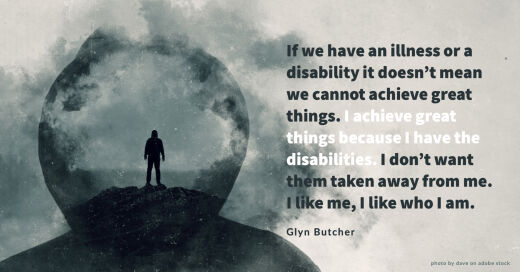Glyn explains how he manages the voices he hears and how, with help from his peers, he's turned his life around.
Author: Glyn Butcher
Glyn Butcher describes how he has learnt to manage his mental health on a daily basis.
It's 3:55am the sun is rising, dawn is breaking. I've been awake 45 minutes preparing for the day forward.
There's quiet all around, even the quiet is quiet.
It's my favourite part of the day.
My mind is calm this is my time to give my voices time to talk and time for me to listen to them.
This is a strategy I use to manage my voices - giving them 30 minutes every morning to talk and say what they need to say to me.
I'm not saying this works for everyone. But it works for me. It quietens them down.
I have found by doing this I can manage my life with much more control. I suppose when I say talk to me, I mean really talk to each other about me but they want me to listen. They want to connect with me.
When I don't give them time to talk they get louder and louder and the noise in my mind is unbearable and that's when I get ill and my life gets unmanageable. I start to talk to myself out loud and there's a visible change in my mood and presentation.
I would describe the voices I hear as like having a radio constantly running in the background; they are not necessarily talking to me, they are talking about me. It's like having a running commentary on me and my life.
They get louder when I'm physically ill or when I have dairy products or when I have alcohol. They get louder, negative, aggressive and much more critical about me, swearing and calling me nasty names. They get worse around around Halloween or Christmas time.
They are not aways critical voices they say nice things too. But they do tell me to kill myself and that people are witch's and wizards and are trying to steal my soul and they are beaming constant messages in my head to die.
The pattern of a decline in my illness goes something like this:
There is much more; this is just a snapshot of the changes in me.
I'm not like that now. I'm just explaining what happens to me. I love my life, my friends, PFG, my kids.
I have a wonderful life.
Peer Support - being with my Peers who make me feel safe is the only thing that has ever worked for me to help me get better, and get me to a stage in my life where I can manage me, instead of having multiple agencies managing my life.
If we have an illness or a disability it doesn't mean we cannot achieve great things. I achieve great things because I have the disabilities. I don't want them taken away from me. I like me, I like who I am.
My greatest achievement is being alive at 50 years old after multiple suicide attempts and wanting to die everyday for years and lots of drug and alcohol issues - I've turned my life around.
Today I want to live everyday. I've got a beautiful daughter who's given me a beautiful grandchild. I've got a beautiful brother, David. I've got Mum who drives me daft, but I wouldn't change for the world. I'm a Director and a Peer of the greatest organisation in the world PFG Doncaster and I get to hang out with you lovely lot every day, my life is great.
We all need something to get up for everyday and my something is you.
Thank you for listening, Glyn

The publisher is Citizen Network Research. My Mental Health © Glyn Butcher 2022.
community, mental health, Peer Support, England, Article